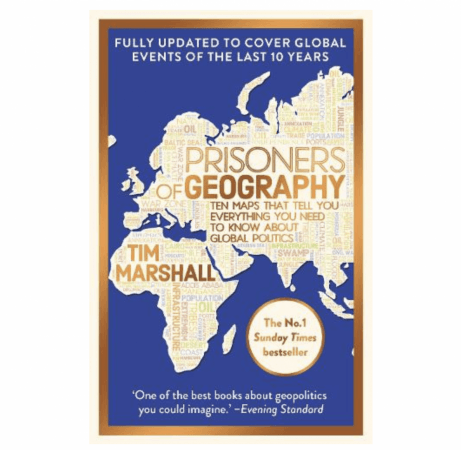
Tim Marshall's Prisoners of Geography first appeared in 2015 as a cogent response to a world entering fluid multipolarity. Now, in its 10-year anniversary edition (2025), Marshall returns with over 30,000 words of fresh analysis, refining his thesis that geography remains the fundamental constraint and enabler of state behavior. In doing so, he offers what may be the most lucid integration of Mackinder's Heartland Theory, Spykman's Rimland logic, and modern hybrid war realities into one accessible volume.
"Geography doesn't argue; it simply asserts." - Tim Marshall
Ten Maps, One Strategic Compass: Updating the Planet's Power Fault Lines
While retaining his trademark ten-region framework, Marshall injects contemporary developments into each geography:
Russia–Ukraine Conflict (2022–24): A resurgent Russia pushes westward, driven by its need for warm-water access and buffer zones reviving the "near abroad" narrative.
China and the Indo-Pacific: Taiwan's strategic vulnerability and Beijing's maritime assertiveness are reframed through both Mahan's sea power thesis and current PLA–AUKUS counterbalancing.
Middle East Realignment: From Abraham Accords to Iran's strategic patience, geography and oil continue to dictate the shifting sands.
Africa's Strategic Reawakening: The Sahel, Horn of Africa, and Red Sea chokepoints emerge as new theatres of contestation.
India's Twin Theatre Dilemma: Between the Himalayas and the Indian Ocean, India's strategic geography compels a dual continental-maritime doctrine.
Each map is redesigned, and each chapter re-narrated to reflect the post-COVID, post-Ukraine, AI-era terrain of statecraft.
Measured Against the Modern Masters: A Comparative Lens
While Peter Zeihan's The End of the World Is Just the Beginning focuses on supply-chain fracturing, and Rush Doshi's The Long Game dissects China's strategic patience, Marshall's contribution is foundational: why do states behave the way they do, before ideology, before economics, before policy?
Where Zeihan leans heavily on economic determinism and Brands on ideological conflict, Marshall operates from a more pragmatic realism, anchored in mountain ranges, rivers, ports, and deserts. His is the geopolitics of terrain, not temptation.
Even compared to Gordon Chang's alarmist Plan Red, Marshall's work is analytically grounded, sober, and non-sensationalist.
Strategic Geography in the Cybernetic and Deglobalized Age
What makes this edition truly timely is its intersection with new-age security paradigms. Wherein he mentions about:
Geography of Chips: As Chip War (Chris Miller) explores the semiconductor arms race, Marshall adds spatial logic: why TSMC's location in Taiwan is both strategic asset and Achilles heel.
Energy Corridors and Chokepoints: From the Bab el-Mandeb to the Malacca Strait, the book draws attention to fragile arteries of global flow.
Climate Change and Migration: Marshall subtly re-frames climate as a geographic stressor displacing populations, redrawing threat maps.
Digital vs. Territorial Sovereignty: He acknowledges cyber's rise, but reasserts: "servers may be virtual, but sovereignty is still territorial."
What the Book Offers That Others Don't.
Unlike traditional IR theorists or think tank monographs, Marshall's gift is translation without dilution. He makes concepts like strategic depth, buffer zones, resource corridors, and access denial clear to the general reader and actionable for the policy practitioner.
Notably, his insights align with India's IMEC Corridor strategy, NATO's eastward reinforcement post-Ukraine and Japan's military normalization
The re-militarization of Red Sea maritime space
Limitations and Balancing
While Marshall's geographic framing is elegant and enduring, it does not fully engage with either the weaponization of finance and SWIFT diplomacy, Space-based power projection or the lunar theater or even the Algorithmic sovereignty and AI-governed conflict
His updates nod in these directions but don't map them explicitly. Thus, pairing this book with Martin Wolf's Crisis of Democratic Capitalism or Hal Brands' recent works can provide a more holistic 21st-century geostrategic picture.
Strategic Relevance for the Immediate Future
As the world moves deeper into a post-Westphalian competitive era, this book will serve as a primer for emerging diplomats and military officers, toolkit for boardrooms navigating global supply threats and a framework for scholars analyzing security doctrine in geographic theaters. Marshall's work is essential reading for a world where power is no longer bipolar or rules-based, but topographically tethered, technologically refracted, and tactically adaptive.
"For those who seek to understand state intent, forget slogans read maps."
Strategic Compass in a Disoriented World
The 2025 edition of Prisoners of Geography is a refined and necessary doctrine for navigating a fractured, hyper-connected, yet terrain-constrained global order. For India, the Global South, and Western alliances alike, it offers a map not just of place, but of power.
Recommended for: Military colleges, foreign services, security think tanks, global investors, strategic planners, and young leaders aiming to read the world's next chapters through the oldest lens of all land.
[Reviewed by: Major General Dr Dilawar Singh, an Indian Army Veteran, Thought Architect, Author and Emerging Technologies promoter.]

















